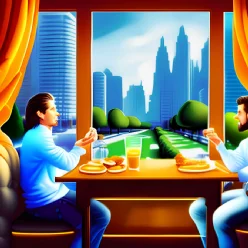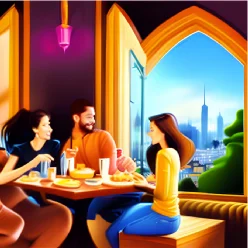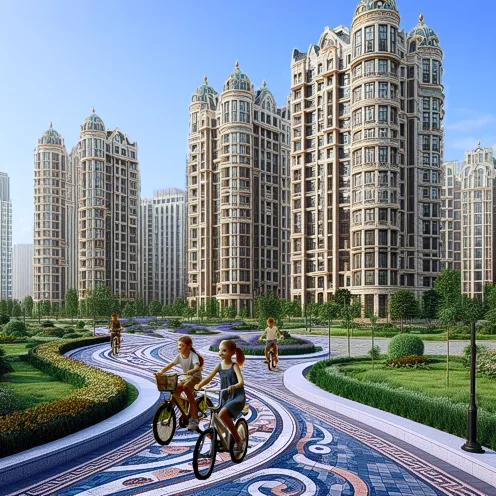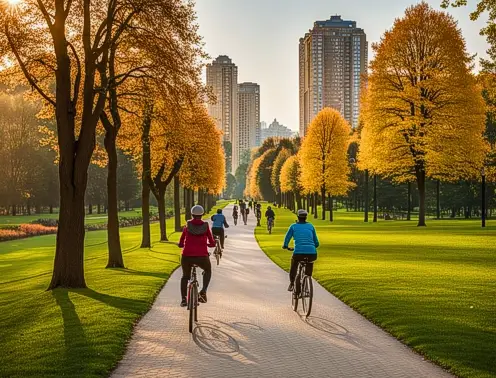After working, we should enjoy meals
The Jobs document pointed
out that our primary pleasure in life should come from working with our
team members, and this document points out that our meals should be our
primary source of pleasure during our leisure time.
Our prehistoric ancestors loved to spend every day working, and then
getting together in the evening to eat, relax, and socialize. We
evolved for that type of life, so we should design our culture to
provide it to us.
We do not get much enjoyment from our meals when we eat them in our
automobile, or when we are eating alone. However, just as no culture
cares whether we enjoy our jobs, no culture cares whether we enjoy our
meals.
The Dining Minister is required to experiment with our culture in order
to make meals one of our most pleasurable leisure activities. In
addition to looking for ways to make restaurants and meals more
enjoyable, he and the other ministers can experiment with ways of
making it easy for us to enjoy other people before, during, and after
our meals.
For example, by putting some restaurants in a beautiful park, along
with some social and recreational facilities, people will be able to
get together to go swimming before dinner, or take a walk through the
park after dinner to go to a Karaoke facility or a social club.
 Those restaurants would
provide us with meals in a beautiful and quiet
setting, and by restricting the people in the city to those who meet
high standards of behavior, we would love having dinner with them, and
participating in social and recreational activities with them. Every
day we would look forward to dinner and the people.
Material items are tools, not sources of pleasure
Most people believe that
their life will improve if they could acquire more material items, but
material items only provide
momentary stimulation. Furthermore, there is a point at which getting
more wealth makes our life worse. For
example, getting a larger house
increases the amount of work we have to do to clean and maintain it.
Most people in the advanced nations have more material items than they
need, and many people have such an excess of items that they put
some of it in closets, attics, garages, basements, and storage
centers. Their lives will not improve
by gathering more
items. Many of them would have an more pleasant life if somebody would
remove their excess items.
Many of the people whose homes are cluttered with items believe that
they would be able to end the clutter problem if they could afford a
larger home, but if they had a larger home, they would collect more
unnecessary items. A cluttered home is not the
result of a small home. It is
the result of people who cannot control their emotional cravings.
Meals are a true source of pleasure
Material items can make our
lives more physically comfortable, but they cannot bring us any real
pleasure. However,
we do
get pleasure from meals and human relationships. Therefore, we would
have a more satisfying life if we could live in a
society in
which we could enjoy our meals and the people we live with. We would
also benefit by developing meals that are less
allergenic and healthier than what we are eating today.
Living in that type of environment would provide us with the pleasure
from the meal,
and the pleasure from people.
If we have two meals a day, that would allow us to have that pleasure
twice a day.
 |
|
 |
|
Every morning
we should enjoy breakfast.
|
|
Every evening
we should enjoy dinner.
|
We should regard meals and people as some of our primary sources of
pleasure, and we should regard material
items as tools
that we
use to make our life more comfortable.
How many people enjoy their
meals?
Some people go to fast food
restaurants when they are traveling, but the people who actually enjoy those
foods seem to be the people who don't have nice meals at home. For
example, Donald Trump can afford to eat high quality meals, but he enjoys
the foods produced by McDonald's restaurants. That is an indication
that the meals made at the McDonald's
restaurants are as good, or better, than his meals he gets at his home.
I suspect that he likes the McDonald's hamburgers because he prefers
meat to be "well done", which most of us would describe as overcooked and miserable.
I have been cooking meat at a low temperature for decades. Long ago I
cooked it at 70°C because I could not control the temperature
accurately, but a few years ago I bought a sous vide device, so now I
cook chicken at 58°C and pork at 57°C. That
produces such juicy and flavorable meat
that I don't need any spices or sauces. I only add a small amount of
salt.
Donald Trump is an example of how wealthy people are not necessarily
having a more pleasant life than the ordinary people. The wealthy
people can afford to eat whatever they want, but how many of them are
enjoying their meals?
Some of them seem to be choosing foods according to the price, rather than according to the
flavor.
I
also wonder how many of them enjoy people
since many of them seem to regard people as opportunities, rather than as friends.
I suspect that there are millions of ordinary people who are getting
more pleasure from meals and human relationships than many of the
wealthy people.
Bodybuilders are another group of people who do not seem to be enjoying
their meals as much as they should. Although they eat healthy meals,
they force
themselves to eat more than they want
to because they are in a battle with their body to
make their muscles grow larger than they were designed to be. Many of
them are eating 5 to 7 meals a day, which results in them eating when
they are not
hungry. That makes eating a chore rather
than a
pleasure. For example, Brian Shaw described
his life as:
"all day long I have to eat, but
it's part of the job."
Our meal should be a pleasure, not a
refueling operation. A remark made by Jay
Cutler, another bodybuilder, that has been
regarded by many other bodybuilders as an inspirational
quote, is:
"I don't eat for taste, I eat for
function."
The bodybuilders are tormenting themselves by
fighting with their
genetic characteristics. If they changed their attitude from having
the most unnaturally large
muscles, to having the most healthy,
attractive, and natural body,
then they would be able to enjoy their
meals. They would also be able to move their arms and legs in a natural
manner when they walk, rather than waddle like a duck.
Meals
should be a pleasurable aspect of our life,
not a chore to
refuel our body.
|
We get pleasure from chewing food,
but Brian Shaw made an interesting remark about how he likes to cook
eggs:
"One thing that I've learned over
the years with eggs is that you don't want to cook them too long. You
want to make sure they're still soft, because in a big quantity,
they're easier to eat if they're a little bit softer."
I also discovered that I like to cook eggs
at a low temperature, (at
70°C for about 6 to 10 minutes), but I do it because I prefer the flavor of the eggs
when cooked like that, not to
make them
easier to eat.
Designing meals to make them easier to eat is not much different than
putting a tube down our throat and pumping
food into our stomach, as farmers do with geese to make foie gras.
Likewise, the people who want food that " melts in their mouth"
are denying themselves the pleasure of chewing their food.
Many of the snacks that people prefer are those that are crunchy and
require chewing. An example are the toasted almonds
and other
nuts that have been coated with a flavor or sugar. A raw almond does
not have much flavor, and we don't particularly care for the
texture, but when toasted, it becomes crunchy, and when coated with a
flavor, then we get the type of food item that we enjoy the most;
namely, a strong flavor that we can chew.
Sprouting and then drying the almonds also make them more crunchy.
Another example is that many people prefer chocolate that has something
crunchy in it, such as toasted nuts or rice. When we eat
chocolate that does not have anything crunchy in it, we tend to chew
the chocolate rather than let it dissolve slowly because we have such a
strong desire to chew food.
Chewing a chocolate bar causes it to be consumed quickly, thereby
providing us only a few moments of pleasure. If we instead put a small
amount of chocolate in our mouth at a time, and let it dissolve slowly,
we enjoy the chocolate for a tremendous amount of time. That will give
us a lot more pleasure per calorie.
However, our enjoyment of chewing is so strong that we have a difficult
time allowing chocolate to dissolve slowly.
Another example is that many people put crackers or croutons into
soups, and some people put croutons or other crunchy things, such as
nuts, in salads. This is more evidence that we want to chew our food.
Why do we enjoy chewing gum?
A lot of people chew on ice
cream and
ice cubes, and some people chew on "chewing gum". When I was in school,
many of us would occasionally chew on our pencils.
Why do we enjoy chewing gum and chewing on pencils? Some people believe
it is to relieve jaw pain, or due to a "nervous disorder", but it seems
more likely that we evolved to chew our food, and so we have an emotional craving to chew.
Therefore, we should design meals so that we can chew our food.
Eliminating menus
simplifies our lives
One method of simplifying
our meals and our lives is to prohibit menus at the restaurants that
prepare meals,
and require their customers to make reservations ( this was
mentioned here).
That would allow every restaurant to plan their meals ahead of time,
and the Food Ministry would deliver only the foods that the restaurants
need. There would be no wasted food because the restaurants would be
given
only as much food as there were reservations.
Instead of choosing a meal from a menu, a person would choose a
restaurant according to the meal it was providing. By
eliminating menus, nobody at the restaurants would have to waste
their time taking orders from people or making different meals for each
person. This would reduce labor at the restaurants because they would
mass-produce only one type of meal at their maximum efficiency. It
would also provide customers with the maximum freshness of ingredients.
To be more accurate, eliminating the menus would not truly eliminate
menus. It merely replaces the menus within a restaurant to a menu that
lists all of the restaurants and the meals that they were providing.
With modern technology, a person could access the list through a phone
or computer, and using his voice to request where he could find a
particular type of food, or to ask what a particular restaurant was
serving.
People must be responsible at
restaurants
In order for us to truly
enjoy having every meal in a
public restaurant, we need to ensure that we enjoy eating among the
other people. This requires setting standards of behavior for the
people and evicting those that are rude, irresponsible, and obnoxious,
or putting them on restrictions, such as restricting them to certain
neighborhoods.
In a free enterprise system, businesses tend to allow people to be
irresponsible and obnoxious at restaurants, such as making a lot of
noise, leaving a mess on the table or the floor, and making
reservations and then showing up late, or not showing up at all. The
restaurants that have salad bars, buffets,
and smorgasbords have even more trouble with sloppy and obnoxious
people.
This Constitution sets higher standards for people, and none of the
restaurants can pander to the public. The restaurants are prohibited
from
treating
their
customers as Kings and Queens. Rather, everybody in the city is
regarded as a team member of equal status, and everybody is expected to
treat other people in a respectable manner.
Every restaurant is free to discriminate against their customers.
Therefore, if the restaurant employees do not like the behavior of a
customer, they can prohibit him from entering. Nobody has a right to
eat at any particular restaurant.
Restaurants compete to be beneficial, not popular
In a free enterprise
system, the restaurants compete to make profit,
and that puts pressure on them to attract a lot of customers, and to
tolerate abusive and wasteful customers. It also encourages the
restaurants to provide meals that taste good but are not necessarily
healthy. This constitution changes the situation by putting the
restaurants in competition to be the most beneficial to society. Specifically:
| 1) |
|
The restaurants
must provide meals that are tasty, but they must follow
the health guidelines of the Meals Ministry. This allows the Meals
Ministry to ensure children become accustomed
to healthy meals. |
|
|
|
2)
|
|
The restaurants
must provide meals in an efficient manner so as to
reduce the labor and resources required to produce and distribute food
items, and to prepare and clean up meals.
A restaurant does not have to
attract a lot of customers. Rather, it only has to provide food in an
efficient manner. A person is allowed to operate a restaurant even if
he's
only serving 12 customers for dinner, if he can produce those meals
efficiently. |
|
|
|
3)
|
|
The restaurants
must provide an environment that is so desirable we prefer to eat at
the restaurants rather than our home. This puts pressure on the
restaurants to prohibit the annoying
customers so that they can create a pleasant environment for the other
customers.
If a restaurant prohibits somebody, it will affect his social credit
score, and if enough restaurants prohibit him, he risks being
restricted to certain neighborhoods or evicted. |
Every restaurant executive
can decide if he wants to require
reservations. He can be even more restrictive and specify the
time at which he will serve a meal. For example, he might specify that
dinner will be served at 18:00.
By specifying the time at which the meal is served, and by requiring
reservations, the chef will know exactly how many meals to produce,
thereby reducing food waste to the minimum possible, and providing
everybody with a fresh, warm meal. It would be similar to going to
somebody's
house for dinner.
The people who make reservations but do not cancel them ahead of time
will have that irresponsible behavior listed in their database entry.
The
restaurant executives have the option of prohibiting those people from
their restaurant.
The concept of restaurants and government officials keeping track of
people who are late for the reservations might seem like a policy from
a dystopian Hollywood movie, but it is the type of policy that all us follow. For example, parents
are aware of which of their children are late for dinner, and when we
arrange a dinner with our friends, we are aware of which of our friends
are late, or never show up.
We are also aware of which of our friends
and family members are obnoxious, irresponsible, sloppy, or
destructive. Those people hurt their social credit score that we
maintain within our mind, and we might not invite them to dinner again.
This Constitution creates a city that is essentially a large group of
friends, and everybody has the right to know the truth about the people
that they live with, and that includes knowing which people are the
most irresponsible, obnoxious, and destructive.
That information is also useful when trying to decide who should
have restrictions on their reproduction.
Our dinners should be social
affairs
Our prehistoric ancestors
got together every evening to eat, relax, and socialize, but today the
people in the wealthy nations frequently have dinner in their home by
themselves or with their family members. Then many of them spend the
rest of
the evening in their home. When they go to restaurants, they usually go
with the same
people that they eat with at home, and they don't socialize with
anybody at the restaurant.
This Constitution designs the city and its culture to make it easy for
us to have a meal and spend the evening with other people. For example,
by living in
clusters of tall apartments buildings that do not have kitchens,
everybody will have to go to restaurants for their meals, or pick up
some food for a picnic, which will encourage us to have meals with
their friends or coworkers.
Even more important, by reducing " diversity", the people
will be more compatible with one another, and by setting high standards
of behavior, we will be living among people that we trust and enjoy.
Those changes will provide a much more friendly and safe social
environment, which will increase the chances that everybody has plenty
of friends and a spouse. Instead of being frightened by strangers, we
will often enjoy meeting them.
Furthermore, the restaurants are allowed to do things that are
difficult in a free enterprise system, such as providing only partial meals. This allows us to
get together with some friends at a restaurant for an appetizer, and
then walk to another restaurant and get together with some other people
for the main course.
In a free enterprise system, a restaurant that served only a simple
appetizer would have trouble making enough profit to pay its rent, so
it would likely be small and cramped. However, the Restaurant Ministry
puts human life ahead of profit, so they will allow an "uneconomical"
restaurant to exist if it provides us with a more pleasant life.
This will allow us to have spacious, comfortable restaurants that serve
appetizers, and when we are finished with the appetizer, we could
wander around the city to do something, or have our main meal.
 |
|
 |
|
We could meet
friends for
appetizers before dinner.
|
|
Then we
might have
dinner with our spouse.
|
When we are finished with dinner, we can walk or take an
elevator to one of the recreational or social activities in the
neighborhood, or we could take a trip on the underground
transportation system to some other neighborhood or recreational area.
The Leisure and Social Club Ministers are constantly experimenting with
activities in order to encourage us to do something in the evening
rather than sit at home, so there will be plenty of things for us to do
in the evening.
The Quality Division is required to keep crime at such a low level that
parents are not
frightened to let their children go to the children's facilities by
themselves, or let their children ride bicycles or electric vehicles
around the city. That will allow the adults to do things in the evening
without providing
security for their
children.
That friendly social environment will encourage adults to get together
with their friends or family members after dinner and do something,
even if it is a "simple" activity, such as listening to music, or
relaxing
in a lounge room, or watching a documentary in a video
room.
By providing all of the neighborhoods with lots of foot paths, plazas,
bicycle paths, swimming pools, and
other recreational options,
and by evicting criminals, the children would
be able to play outdoors
after dinner by taking a short walk from the restaurant. They would not
have to spend their time at home with a television, or have their
parents drive them to a friend's home.

The
adults could also get out into nature to take a walk, go swimming,
drift along a canal in a row boat, or take a ride on a bicycle during
the sunset. Bicycle stores are scattered around the city, so a person
could pick one up at any of the stores, ride it to any destination,
and leave it at any other bicycle store. He could then continue doing
other things, such as eating, getting involved with some recreational
activity, or relaxing in one of the social lounges at the top of a
building.

Robots can already retrieve items from a warehouse and put them back,
so they will soon be able to allow a person to request a robot to bring
him a bicycle, drone, raincoat, binoculars, camera, phone, laptop
computer, or other item, and when a person is finished with the item,
he could request a robot to pick it up and put it back into storage.
|
